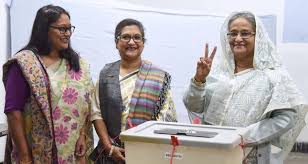Bangladesh’s PM Hasina wins third straight term; opposition cries foul

Bangladesh Prime Minister Sheikh Hasina has won a third straight term, sealing a landslide with almost all the seats in parliament, officials said on Monday, while the opposition rejected the result as rigged and called for a fresh vote.
Hasina’s win in Sunday’s general election follows a decade in power in which she has been credited with improving the economy and promoting development, while being accused of rights abuses, a crackdown on media and suppressing dissent.
The government rejects those accusations.
An alliance led by Hasina’s Awami League won 287 of the 298 seats for which results have been declared, the Election Commission said, though it added it was investigating allegations of vote rigging from “across the country”.
The main opposition Bangladesh Nationalist Party (BNP), which had boycotted the last general election in 2014 saying it would not be fair, won just six seats this time.
BNP leader Khaleda Zia – Hasina’s arch rival and a former prime minister – was jailed in February on corruption charges she says were politically motivated. This was the first election in which the BNP campaigned without her.
The rivalry between the two women – both related to former leaders – has largely defined Bangladeshi politics for decades.
Raising minimum wages for workers in Bangladesh’s robust garments industry, the world’s second-biggest after China’s, could be one of Hasina’s first tasks, party leaders have said.
Hasina and opposition parties were due to hold separate news conferences on Monday.
‘UNPRECEDENTED’
Opposition leader Kamal Hossain said their alliance, the National Unity Front, led by the BNP, had called on the Election Commission to order a fresh vote under a neutral administration “as soon as possible”, saying the vote was flawed.
The government has rejected similar opposition demands in the past, and was likely to dismiss this one too.
At least 17 people were killed during the vote, police said, after a violent campaign in which the opposition alleged the government denied it a level playing field.
“We’ve had bad elections in the past but I must say that it is unprecedented how bad this particular election was,” 82-year-old Hossain told Reuters late on Sunday.
Candidates reported witnessing ballot-stuffing and vote-rigging by ruling party activists, who also barred opposition polling agents from voting centres, Hossain said.
“The minimum requirements of free and fair election are absent,” he said.
Hossain said he would meet opposition alliance members on Monday to decide their next step.
However, Sajeeb Wazed, Hasina’s son and an Awami League member, told Reuters no one was intimidated into voting for the party and accused the BNP of pre-election violence.
“Overall, there were long lines at polling stations and voting was peaceful … democracy is stable and flourishing,” Wazed said by email.
Indian Prime Minister Narendra Modi telephoned Hasina to pass on his congratulations, his government said.
“India warmly congratulates the people of Bangladesh for reaffirming their faith in democracy, development,” India said, adding that Hasina had thanked Modi for India’s “consistent and generous” support on development.
‘TOO SUSPICIOUS’
Hasina is the longest-serving leader in the history of the Muslim-majority country of 165 million people.
Most international observers, including some from the United States – which had expressed concern over campaign violence – have not commented on the result.
“Certainly, the Awami League enjoys strong constituencies and has support and it can get votes, but for any party to win more than 90 percent of the seats is simply too suspicious,” said Michael Kugelman, South Asia senior associate at the Washington-based Wilson Center think-tank.
“I fear that this election result signifies that Bangladesh has really become something very closely approximating a one-party state.”
Human Rights Watch also expressed concern over the election’s credibility, while Amnesty International called for an impartial investigation of “deeply disturbing” election violence.
Hundreds of opposition workers were arrested in the months before the election on charges that the opposition said were “fictitious”. Many said they were attacked by ruling party activists, crippling their ability to campaign.
Hasina’s government has denied the accusations and her party says many of its own workers were hurt by the opposition.
Voter turn-out appeared to be thin. The Election Commission is due to declare figures late on Monday.
The commission has said it would hold a fresh vote for one seat where the poll was marred by violence. Another constituency, where a candidate died days before the vote, will also go to the polls in the next few days.
Wazed said on Saturday the next government would try to lift growth to 10 percent, from 7.8 percent in the 2017/18 financial year.
He also said minimum wages in the garments industry, which with sales of more than $ 30.6 billion generates about 83 percent of exports, would be raised.
Wazed said the government wanted to diversify into electronics.
India helped Bangladesh win independence from Pakistan in 1971 but Wazed said China, its other top investor, had been “very proactive” about investment.
